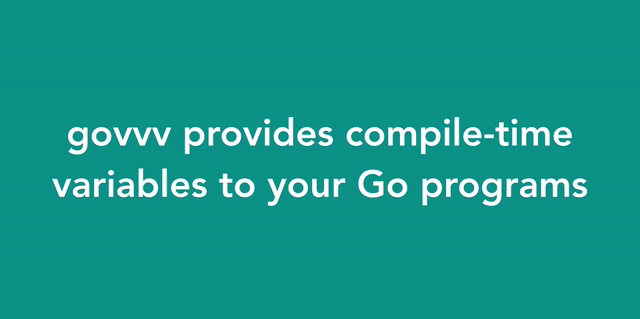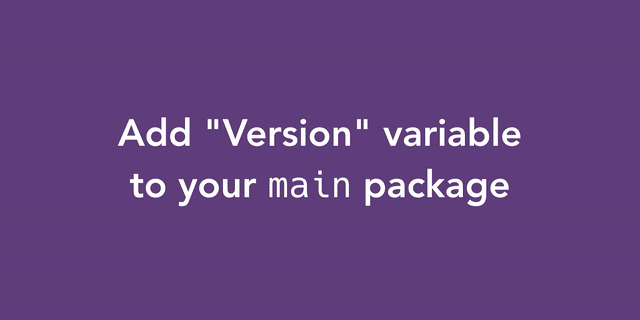https://github.com/ahmetb/govvv
"go build" wrapper to add version info to Golang applications
https://github.com/ahmetb/govvv
go versioning
Last synced: 2 months ago
JSON representation
"go build" wrapper to add version info to Golang applications
- Host: GitHub
- URL: https://github.com/ahmetb/govvv
- Owner: ahmetb
- License: apache-2.0
- Created: 2016-08-02T22:30:23.000Z (almost 9 years ago)
- Default Branch: master
- Last Pushed: 2023-03-24T16:51:49.000Z (about 2 years ago)
- Last Synced: 2025-04-13T00:48:27.100Z (2 months ago)
- Topics: go, versioning
- Language: Go
- Homepage:
- Size: 66.4 KB
- Stars: 538
- Watchers: 10
- Forks: 40
- Open Issues: 1
-
Metadata Files:
- Readme: README.md
- License: LICENSE
Awesome Lists containing this project
- awesome-go-extra - govvv - 08-02T22:30:23Z|2020-02-03T18:05:00Z| (Go Tools / DevOps Tools)
README
# govvv
The simple Go binary versioning tool that wraps the `go build` command.
> :warning::warning::warning: **DEPRECATED:** Go now offers [build info](https://pkg.go.dev/runtime/debug#BuildInfo) natively. Please migrate to use that instead. I am no longer planning to maintain this project.

Stop worrying about `-ldflags` and **`go get github.com/ahmetb/govvv`** now.
## Build Variables
| Variable | Description | Example |
|----------|-------------|---------|
| **`main.GitCommit`** | short commit hash of source tree | `0b5ed7a` |
| **`main.GitBranch`** | current branch name the code is built off | `master` |
| **`main.GitState`** | whether there are uncommitted changes | `clean` or `dirty` |
| **`main.GitSummary`** | output of `git describe --tags --dirty --always` | `v1.0.0`,
`v1.0.1-5-g585c78f-dirty`,
`fbd157c` |
| **`main.BuildDate`** | RFC3339 formatted UTC date | `2016-08-04T18:07:54Z` |
| **`main.Version`** | contents of `./VERSION` file, if exists, or the value passed via the `-version` option | `2.0.0` |
## Using govvv is easy
Just add the build variables you want to the `main` package and run:
| old | :sparkles: new :sparkles: |
| -------------|-----------------|
| `go build` | `govvv build` |
| `go install` | `govvv install` |
## Version your app with govvv
Create a `VERSION` file in your build root directory and add a `Version`
variable to your `main` package.

Do you have your own way of specifying `Version`? No problem:
## govvv lets you specify custom `-ldflags`
Your existing `-ldflags` argument will still be preserved:
govvv build -ldflags "-X main.BuildNumber=$buildnum" myapp
and the `-ldflags` constructed by govvv will be appended to your flag.
## Don’t want to depend on `govvv`? It’s fine!
You can just pass a `-print` argument and `govvv` will just print the
`go build` command with `-ldflags` for you and will not execute the go tool:
$ govvv build -print
go build \
-ldflags \
"-X main.GitCommit=57b9870 -X main.GitBranch=dry-run -X main.GitState=dirty -X main.Version=0.1.0 -X main.BuildDate=2016-08-08T20:50:21Z"
Still don’t want to wrap the `go` tool? Well, try `-flags` to retrieve the LDFLAGS govvv prepares:
$ go build -ldflags="$(govvv -flags)"
## Want to use a different package?
You can pass a `-pkg` argument with the full package name, and `govvv` will
set the build variables in that package instead of `main`. For example:
```
# build with govvv
$ govvv build -pkg github.com/myacct/myproj/mypkg
# build with go
$ go build -ldflags="$(govvv -flags -pkg $(go list ./mypkg))"
```
## Want to use a different version?
You can pass a `-version` argument with the desired version, and `govvv` will
use the specified version instead of obtaining it from the `./VERSION` file.
For example:
```
# build with govvv
$ govvv build -version 1.2.3
# build with go
$ go build -ldflags="$(govvv -flags -version 1.2.3)"
```
## Try govvv today
$ go get github.com/ahmetb/govvv
------
govvv is distributed under [Apache 2.0 License](LICENSE).
Copyright 2016 Ahmet Alp Balkan
------
[](https://travis-ci.org/ahmetb/govvv)